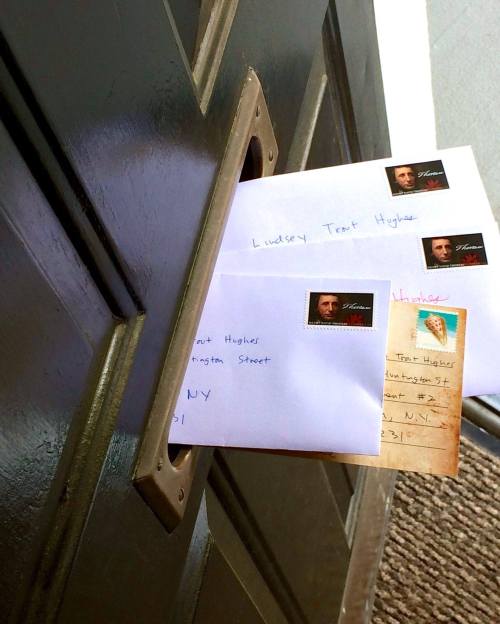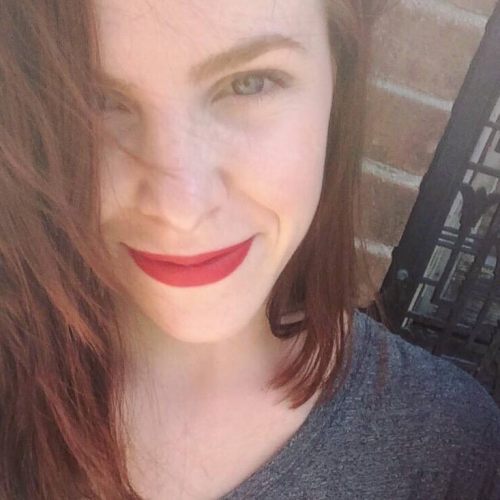Sign Up
by Lindsey Trout Hughes
Hi, Mark!
I hope this note finds you well. I saw your post last week about the spring writing course. I asked Katie Consamus over coffee if she’d like to take it with me and be my writing partner. Wouldn’t you know, she had already signed up! So here I am, hoping to jump on this train, too.
Let me know what you need from me to proceed. I’m very much looking forward to revisiting you and Mev.
Best from Brooklyn,
Lindsey
Summer 2016
by Lindsey Trout Hughes
I posted something on Facebook today
a gut response to that horror in Florida
and anyway it seems to be helping some hurt people
in a small way
and I wouldn’t have posted it
had I not taken your class
so many thanks to you
and now I’ll go cry some more
before I go write out this rage
like a motherfucker
An Interview with Lindsey
MC: Do you read aloud your poems to your husband? To Katerina Consamus?
LTH: The poem I posted on the blog last week was the first poem I’ve ever written. I’ve been writing two or three every day since, but I haven’t read any of them out loud. I haven’t really even reread any of them. I’m doing my best to work on getting the work out without focusing on polish or structure too much at the moment.
MC: What is it like to have two poets living in the same space?
LTH: I’ve only been a poet since last week. I’ll have to get back to you on that one! But I’ve been poet-hearted since birth and my husband is too and he’d be the most insightful person I know. I end up recording a lot of late night conversations with him that often end up in my plays. I have an extensive multi-year sound / conversation library.
MC: Have you thought of doing a YouTube of readings of your poems?
LTH: I haven’t! And the thought is terrifying! But as one of my acting professors always said, Follow your fear to find your truth. Or sometime like that.
MC: Have you been writing this way all through your twenties? If so, how many pages have you accumulated?
LTH: I have been writing off and on in waves of seriousness since I graduated from college— mostly journals and letters, a lot that have been destroyed. Sometimes I’m sad that I wasn’t ready to own all of it yet, but sometimes I think that’s okay. I ghostwrite for people about things I don’t know anything about (architecture, medicine, Emergency Room design) for money. I wrote a play last year and I’m working on my second now. I have half of a novel littering my desktop. My plan is to spend the year working on a cross-genre book that may never be anything more than an interesting way to document time but I that might try to publish if it turns out to be interesting to anyone but me— part memoir about my time in New York, part documenting what may be my last year here and part chronicle of my preparations to play Ophelia this fall. It’s very rare that actors are given this much time to work on a role. The project is inspired by one of my favorite books, Year of the King, which is Antony Sher’s diary and sketchbook as he prepared to play Richard III at the Royal Shakespeare Company in 1984.
MC: Shouldn’t every month be national poetry month? (Maybe it is in your home!)
LTH: Yes!
MC: Who is your favorite living poet, someone you can’t get enough of?
LTH: I really love Rebecca Lindberg’s “Love, An Index”. She tells the story of her relationship with another great poet, Craig Arnold. He disappeared while hiking a volcano in 2009. The book is part chronicle of their love, part Rebecca picking up the pieces. It’s quite something.
Also, Sarah Hannah’s “Inflorescence,” another verse-memoir mostly about her mother, an Expressionist painter.
They’re both books I find myself going back to a lot over the past few years.
MC: Do I ask too many questions?
LTH: No! But as a playwright and freelancer and actor, I’m usually on the asking end. It’s a good exercise to have the spotlight turned.
Ecstatic Poet
Dear Lindsey,
I am sitting at my friend Fatima’s home on Laclede Avenue in the Central West End. I wish you lived in STL. Then you would know this home quite well. I’ve been here maybe 30 times over the last three and a half years. I’ve had classes here, Share the Wealth potlucks, activist gatherings. Fatima is alluded to in Dear Layla this way:
Ripples
At a demonstration
Against Israel’s stranglehold on Gaza
Henry made it a point
To introduce me to Aisha
An early forty-something woman originally from Algeria who said
“It’s a pleasure to meet you
Henry’s told me so much about you
She had recently returned home
After three months working in the West Bank
Her face was full of light
Fatima is Moroccan-American, and truly one of the most exuberant and generous people, I’d guess, in the Western hemisphere. Today is our last writing class for Epistolary Ecstasy. So I thought I’d write you, An Ecstatic Poet.
I am full of awe for you—your powers of perception, your expansive soul (K. Consamus, quoting the sage: Expand. Radiate. Dissolve.), your productivity, your vulnerability at blog, in emails, your love of family and friends. I have tears in my eyes considering you. Tears of gratitude.
Mark
The Best Minds of My Generation
For Rob Trousdale and Lindsey Trout Hughes
Re: Allen Ginsberg, The Best Minds of My Generation: A Literary History of the Beats, edited by Bill Morgan
Dear Rob and Lindsey,
I’m grateful to you both for sharing your writing with me and through me, to others—may these poems and pieces continue to animate “Mayahana bodhisattvic compassionate empathy” (A. Ginsberg) in the years to come, ever reverberating through world wide web.
I recently finished Allen’s personal history of his generation of writing comrades put together from his lectures at Naropa and Brooklyn College. I particularly enjoyed the many chapters on Jack Kerouac and Gregory Corso, and want to share with you some passages that may offer you stimulation/encouragement/anamnesis for your own writing practice.
As prof, his method was “to read from the texts, read my favorite fragments or things that were important to us as a group at the time. Big sentences that knocked everybody out, that turned everybody on…. [the] gists [that were] historical epiphanies for us.” [11] Lindsey, as actor, think of the tens of thousands of lines you learned for your roles—you could regale us with so many that would knock us out.
In commenting on Kerouac’s first novel, Ginsberg observed, “I think Kerouac was reading The Brothers Karamazov at the time, and so divided himself up somewhat similarly into Dostoevsky’s characters.” I’m currently editing 400+ pages of manuscript material and find myself doing something similar. [93]
Maybe you both have your versions of Kerouac’s scribbling away in notebooks: “These little notebooks provided raw materials of two kinds: diaristic details, like a reporter’s notes, about events at hand and an endless retracing in memory of all the events in his life, reaching back to his earliest childhood memories in Lowell.” [266] I never tire of mentioning the exuberant text along these lines, Joe Brainard’s I Remember.
I admit, I could let the free writing rip a whole lot faster; here, on Kerouac’s dexterity and celerity: “… the neural rapidity between his brain and his fingers was amazing. Whatever arrived in his larynx or his mind subvocally, could be immediately translated into typewritten finger pecks fast enough to complete long, long sentences including all his parenthetical subdivisions of thought form.” [224]
Remembering how Ginsberg wrote Kaddish over a long weekend, we can experiment with heroic generating endurance: “just sit down and stay there at the typewriter, exhausting his mind completely, everything in his mind, everything he could think of relating to the subject. Not at random, it would’ve to be a subject he was obsessed with, that he’d thought about and maybe at some point and realized, ‘Ahh could write a whole novel about this.’ He sat down and did it like an athlete, like an athletic event.” [258]
You both have allowed me this privileged access to your minds: “You present what you perceive through your senses and other will be able to compare their own sense experience with yours, and thus you present your mind.” [367]
Evocative of Kerouac’s maxim, “No time for poetry but exactly what is,” Ginsberg admits about his breakthrough works, “Basically what I was doing was just making up stuff for my own amusement. As this went along, and the idea that it couldn’t be published anyway, so I might as well be totally free and say anything I wanted, because it wasn’t really in poetry form. … What would you write if you were upon the moon and you knew nobody would ever see it? The writing would be sublime because there would be no reason not to say everything. So that’s the method here.” [393]
Several years back, Eliot Weinberger wrote, “As far as I can tell, the Cheney-Bush II era has not produced a single poem, song, novel, or artwork that has caught the popular imagination as a condemnation or an epitome of the times. The only enduring image is a product of journalism: the hooded figure in the Abu Ghraib photographs. By and large, the artists and writers have been what used to be called ‘good Germans,’ making their little sausages while the world around them went insane. There are only a few who have used their skills –or their magazines!—to even attempt to change the way people think.” Thank you for helping keep me sane and for expanding my sense of the possible.
Mark
Should I Name My Daughter Rose
by Lindsey Trout Hughes
What I mean to call her is this:
A
A Night in June
A Sea-Change
After Rainfall
Allegory of Spring
Ancient Art
B
Bearing Renaissance
Bellringer
Birdsong
Bismuth Crystal
Brass Tacks
C
Champagne Toast
Checkmate
Clarion Call
Consummate Companion
Curtain Rise
D
Diaphanous Prime
Double Knock Out
Dream Sequence
Drifting Weathervane
Dynamite
E
Efflorescence of Spring
Elixir
Empty Gallery
Enigma Engineer
Euphoria
F
Felicity
Fields of the Woods
Finest Hour
Fire in the Hearth
Fortuna
G
Galaxy Light
Gem of the Sea
General Lafayette
Gentle Denouement
Glowing Forest
H
Harbinger
Harvesttime
Hear Hear
Holiday Mood
Honeymilk
I
I Do, I Do
Illumination
Impish Grin
In Full Force
In the Air
J
Jack O’Lanterned Nights
Jaw-Drop
Jazz Time
Jubilee
Just You Wait
K
Kaleidoscope
Keepsake
Kept Folklore
Kick Your Heels
Kismet
L
Laser Beam
Light Fantastic
Like Magic
Lo & Behold
Luster
M
Marching Song
Marvel-Ridden
Matador
Meteorite
Mystery Resolving
N
Name of Action
Nativity
Neon Bright
Northern Light
Nymph
O
Oh My Stars
Oil Colors
One Fell Swoop
Opening Time
Orbiting Moons
P
Palimpsest
Palissades
Physalis Alkekengi
Pirouette
Proud Titania
Q
Queen of Beasts
Question Mark
Quicksilver
Quiet Time
Quite Contrary
R
Rabble Rouser
Rainy Day
Rare Edition
Riparian
Ruby Want
S
Sacred Heart
Sailing Stones
Siberian Jay
Strawberry Hill
Super Nova
T
Talisman
Tanto
Tapestry
Thank You Blue
The Lark Ascending
U
Undersong
Unexpected Clarity
Up With the Lark
Up-and-Coming
Uptown Museum
V
Valor
Velvet Hour
Vespertine
Vision
Volcanic Lightning
W
Weak-Kneed Whistle
Wee Small Hours
Whirlygig
Willow Shade
Witching Hour
X
X Marks the Spot
XO, XO
Xanadu
Xenolith
Xylology
Y
Year Round
Yearning Days
Yes
Yours Truly
You’ll Never Guess
Z
Zenith
Zephyr
Zest Maker
Zibeline
Zoom In
This page is part of my book, Dear Love of Comrades, which you can read here.

